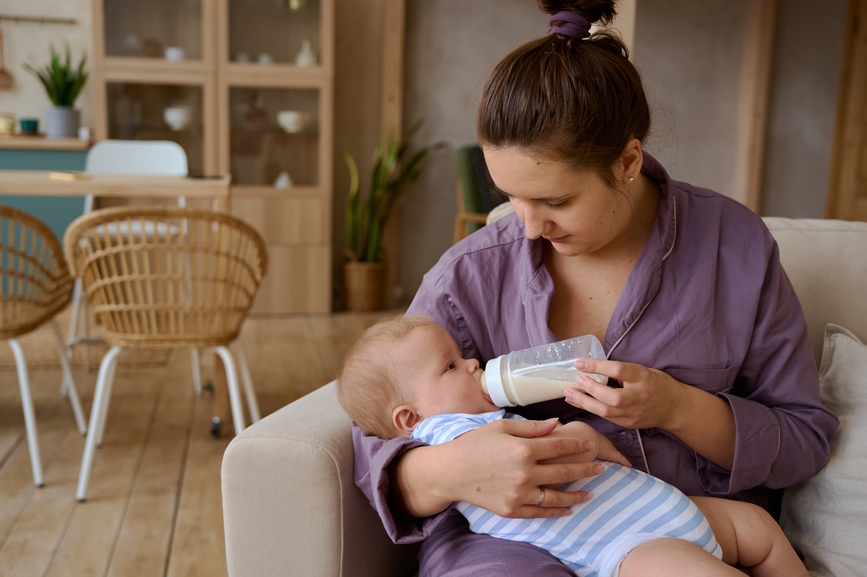Written by Ashley Kane,
Brightside Health
6 Minute Read

Medically reviewed by:
Erin O'Callaghan, PHD
Director of Therapy
10 Minute Read

There are a lot of changes that occur before and after having a baby—your mind and body are adapting to many new things. It makes sense if you’re feeling down or overwhelmed sometimes. If these feelings persist, it’s possible you may be experiencing a mental health condition called postpartum depression.
Postpartum depression is a form of depression that affects new or expecting mothers. It’s relatively common, that one in seven mothers experiences postpartum depression.
Postpartum depression symptoms include:
- Feeling hopeless, overwhelmed, guilty, or angry
- Crying a lot
- Feeling empty or numb
- Feeling disconnected from your baby—not wanting to be around them or worried you will hurt them
- Having an unexplained physical illness like stomachaches, headaches, or nausea
- Lacking energy or having trouble concentrating
- Having sleeping difficulties
- Isolating yourself or being unable to enjoy social situations or activities you once loved
If you think you may have postpartum depression, or think a loved one may be experiencing these signs, it’s important to talk to a mental health professional. Postpartum depression is treatable with therapy and/or medication. It’s also a good idea to talk to your partner or family member about how you’re feeling so they can support you.
What causes postpartum depression?
According to womenshealth.gov, “Hormonal changes may trigger symptoms of postpartum depression. When you are pregnant, levels of the female hormones estrogen and progesterone are the highest they’ll ever be. In the first 24 hours after childbirth, hormone levels quickly drop back to normal, pre-pregnancy levels. Researchers think this sudden change in hormone levels may lead to depression.”
After childbirth, many women have mood swings, feel sad or anxious, lose their appetite, or experience trouble sleeping. These symptoms usually go away 3 to 5 days after they start. Postpartum depression is different—the symptoms last longer and are more severe. Typically, postpartum depression begins within the month after giving birth, but it can also start during pregnancy or up to a year after birth.
6 ways to take care of yourself with postpartum depression
If you’ve been diagnosed with postpartum depression (part of a larger category called peripartum depression), here are a few ways to take care of yourself.
Stay on track with your treatment
Whether your care includes therapy and/or medication, it’s important to keep up with your appointments and treatment plan so you can feel better. At Brightside Health, our expert providers can support you every step of the way with video visits and unlimited messaging. You can also track how you’re feeling, view lessons, and practice reflections.
Lean on others when they offer to help
Having a supportive group of people around you can be really helpful when you’re experiencing postpartum depression. If you feel comfortable, it’s a good idea to tell people you trust about what you’re going through. Try to accept others’ offers to help even if your first inclination is to politely decline or verbally agree to accept the help, only to not act on it later. When someone offers to help, tell them, “Yes, I’d appreciate your help… taking care of the baby, picking up groceries, or helping with cleaning around the house.”
Practice self-care
As a mother, you’re often taking care of others’ needs. Try to remember to do things you enjoy for yourself too. Whether it’s taking a walk outside, keeping a journal, reading a book, or practicing some mindfulness exercises, see if you can do something for yourself every day. Remember, this also includes rest—allow the other parent, friends, or family to help care for the baby outside of your earshot so you can get some uninterrupted rest.
Rework negative self-talk
When you’re experiencing postpartum depression, you might feel guilty or ashamed. You might even think difficult thoughts such as, “I’m bad at this” or “I’m not a good mother.” Know that just because you’re thinking those thoughts doesn’t mean they’re true. Our minds can be skilled at tricking us. If you catch yourself thinking negative thoughts about yourself, there are a few ways you can rework them:
- Write down what you’re thinking and try to challenge it. Consider the evidence that’s for or against your thought. Sometimes, seeing thoughts on paper can help you look at them with a fresh perspective.
- Talk to a mental health provider or to a loved one. Tell them about what you’re thinking or feeling and they can help you think about the roots of the negative thought.
- Consider adding to your thought. You could say “I’m feeling like I’m bad at this, but I’m actually trying my best” or “I’m feeling like I’m not a good mother, but I actually took great care of my baby yesterday and the pediatrician said they’re healthy.”
A therapist can spend time working with you weekly on skills like challenging negative thoughts to help you overcome postpartum depression.
Want to speak 1:1 with an expert about your anxiety & depression?
Spend time with your baby
Postpartum depression can make you feel disconnected from your baby. Try to spend time bonding with your baby by trying skin-on-skin contact or doing one of your preferred activities with them safely tucked away in a sling on your chest. If you feel overwhelmed, let a partner or loved one follow through on the help they may have already offered but was previously politely declined.
Make small goals
When you’re experiencing postpartum depression, things that were once small tasks for you can feel large and insurmountable. Know that you won’t always feel this way. If you can, try to make a small goal for yourself like taking a shower or emptying the dishwasher. Your therapist can also help with goal-setting. Small goals lead to small wins which can help inspire the motivation needed to take on larger tasks that previously felt impossible.
Takeaways about postpartum depression & self-care
Being a new mother involves a lot of changes. Be kind to yourself during this process and remind yourself that things will get better. Don’t hesitate to ask for help or talk about how you’re feeling—your health matters and you’re doing a good job.
Most importantly, know that postpartum depression is treatable with mental health care. At Brightside, 86% of members experience significant improvement and 71% achieve remission from their symptoms altogether in 12 weeks. Start getting quality care for postpartum depression today with a free assessment.
Want to speak 1:1 with an expert about your anxiety & depression?














